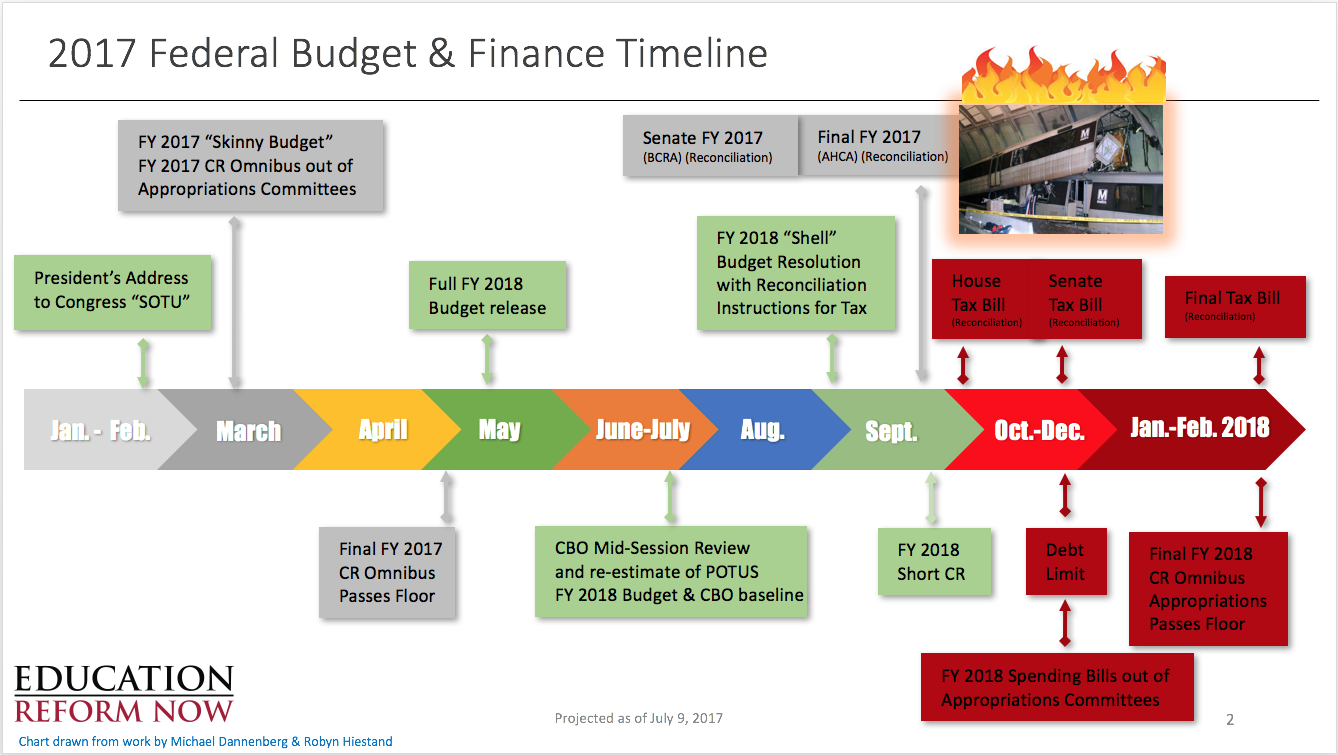It’s easy to get distracted by President Trump’s histrionics and the reported Russia collusion – cover up machinations, but Democrats would be wise to keep their eyes on bread and butter budget issues as well.
There’s a not inconceivable possibility that we’re headed for Washington’s version of a train wreck, the outcome of which will determine education funding (among other major domestic policy areas) for millions of children.
Here’s how we see the possibility of wreck playing out.
Republican leaders need to address health care, overall federal spending, and raising the debt limit. And they’re going to need to make decisions with which they all won’t be happy.
Republicans have been running on health care for seven years, have majority control of the federal government, and will be held responsible if Obamacare implementation fails. In short, as of now, “Republicans own health care.” They have to deal with health care, pass spending bills to keep the government from shutting down (ask Newt Gingrich and Chris Christie how things work out politically if they fail), and raise the debt limit in order to avoid default and potentially catastrophic economic consequences.
If the past is prologue, super conservative Freedom Caucus Republicans (former Speaker John Boehner (R-OH) probably would call them unreasonably conservative) will think they can get their way on all three issues by pressuring moderate Republicans to the extent they exist. So, Congressional Republicans will go through the motions of trying one-party rule. For the last two months, that’s what we’ve been seeing on health care. Note: it rarely works.
Beginning this month and stretching into September, we’ll see the Republican House Appropriations Committee attempt to advance federal spending bills for a variety of domestic areas, including education. For labor, health and human services, and education programs that cover next school year, Congressional Republicans are likely to propose less funding than last year albeit more than President Trump’s cut. In all likelihood, it won’t satisfy the super-conservatives. To pressure for deeper domestic spending cuts, they are apt to withhold support of the annual spending bill. They’ll hope that will leave mainstream Republicans without a majority of the House of Representatives. And it probably will unless mainstream Republicans cut a deal with Democrats. In the end, they’ll likely do it, but many rank and file Republicans will be loathe to do so. That’s where the possibility of a train wreck comes in.
To ratchet up pressure and inspire compromise, all parties in Congress are apt to agree to a short-term extension of the annual spending bill debate. There’s a good chance it’ll be just far enough to coincide with the time the national debt limit must be raised by an Act of Congress. And if that happens, the short-term extension sets up the proverbial, political train wreck. (See chart above. We keep wondering if we should’ve used a graphic from Amy Schumer’s movie instead of the Washington Metro.)
This particular wreck consists of must-make major decision points on domestic spending, debt-ceiling authorization, and possibly health care all occurring at once. Because the first two areas are not filibuster-proof, and independent of a filibuster all three areas probably require some Democrats to agree for Congress to come up with a majority that can act, it creates a moment of high leverage. Compromise or see the government get shutdown and default on the national debt — the political consequences of which are grave and unpredictable.
The Republican leadership is preparing for all contingencies. They know that the threat of a wreck might not be enough. But for all Republicans, there’s one thing that will make a series of painful compromises on overall domestic spending, raising the debt limit, and health care easier to take. Tax cuts.
Hence, some time in September if not sooner, the Republican Congressional leadership likely will move an FY 2018 shell budget resolution with reconciliation instructions to set in motion a filibuster-proof tax bill. But big tax bills take time to put together. We can’t see it being done in three or four months. So a deal on domestic spending and the debt ceiling will have to be made first.
Public education advocates would be wise to prepare for this coming moment by uniting and trying to get Democratic leaders to use their leverage to ensure not one penny is cut from the overall education budget (including reserve funds). Maybe they should go even further and demand substantial growth in support for public education in underfunded areas like IDEA special education and the Charter Schools Program this year and beyond.
Can public education advocates unite and generate enough pressure on Democrats to hold the line at least on public education funding? We’ll see. We hope so.
Resist, yes. But insist on behalf of education funding as well.
